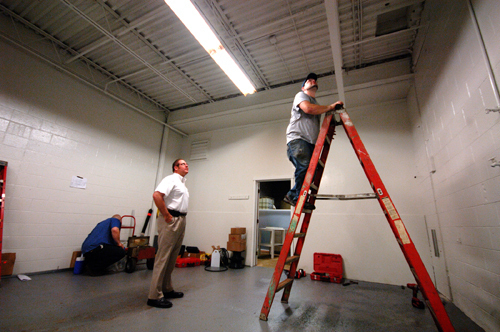
It wouldn’t even make the list of hot careers sought by most young job-seekers, yet manufacturing remains an essential segment of the Rhode Island economy. Employing about 48,000 people with a payroll of more than $2.3 billion, it can offer workers good wages, on-the-job training and opportunities for advancement. The average annual manufacturing wage was $53,798 in Rhode Island in May, according to state figures.
And the industry in Rhode Island is changing dramatically, moving from a low-wage, assembly-line model to a cleaner, leaner operation characterized by advanced technology, intensive work force development and substantial investment in the business infrastructure, advocates say.
“This isn’t just something out in the future. We are making that transition,” Saul Kaplan, executive director of the R.I. Economic Development Corporation (RIEDC) said of the changing manufacturing sector during the opening of the $30 million Aspen Aerogels Inc. plant in East Providence last week. (READ MORE) Aspen designs and manufactures energy-efficient insulation products.
Kaplan said the new factory is evidence that manufacturing is not dead in the Northeast and suggested that what the industry needs is new technology and forward-thinking businesses.
Leslie W. Taito, chief executive of the R.I. Manufacturing Extension Services (RIMES), an independent agency devoted to supporting manufacturers, says that “the perceptions people have about it are as old-line as the old-line manufacturing.” But Rhode Island is “moving away from the big, massive industry that produced the same product over and over again,” she said.
“If someone made a decision now to be a machinist – in the true sense of the word, not a lathe operator – they would chart a path for themselves with unlimited potential,” said Steven Kitchin, vice president of corporate education and training at the New England Institute of Technology in Warwick. “Try finding a trained machinist or a millwright today.”
Taito, who has been in charge of RIMES for a decade, said American manufacturers have found they cannot compete successfully with the low-wage, assembly-line form of production moving overseas at an increasing rate. Foreign competition and the demands of an educated consumer base have forced manufacturers to streamline and customize operations or, as Taito put it, “they’ve been forced to do it faster and better.”
She used the auto industry as an example, pointing out that in the early years of the last century Henry Ford manufactured Model-T’s that were all the same. The consumer today demands a choice in models, colors and a host of other features when buying a car. “Manufacturers must be able to change processes very easily and very quickly,” she said, to meet constantly changing consumer demands.
The closing of an old-fashioned assembly-line, low-wage factory always makes headlines, contributing to the image of the industry as one with a bleak future, Taito noted, while advanced manufacturers who steadily grow and add three or four jobs a year win no notice. “But that’s real growth, sustained growth,” she said of the latter.
“People have a vision of 19th-century factories in their minds, but those places are going by the wayside,” said Geoff Grove, president of Pilgrim Screw Corp. in Providence and Chandler, Ariz. The company has 64 employees in total, with 38 in Rhode Island; including two hired this year. The family-owned private business, in operation in Rhode Island since 1932, specializes in military-specification threaded fasteners and other unique hardware.
Pilgrim Screw has adopted the “lean initiative,” a national program that emphasizes improved efficiency, developed by the Japanese at Toyota plants more than 50 years ago.
Grove said RIMES has promoted the advantages of the lean initiative to Rhode Island manufacturers for about 10 years. “When you adopt lean manufacturing, it becomes the process of the whole shop and, by necessity, employees have to be more of a team than in the past,” he said. On-the-job training is routine at Pilgrim, according to Grove.
Still, the industry’s transition has not been painless. The number of manufacturing jobs in the state has declined steadily. In 2002, there were 64,796 people employed in manufacturing in Rhode Island and, 30 years ago in 1978, there were 134,654, according to figures from the R.I. Department of Labor and Training.
More recently, in May there were 48,100 manufacturing workers, compared with 48,400 a month earlier and 51,100 a year earlier, according to the latest DLT statistics. Those same figures show a slight increase in average hourly earnings for manufacturing, from $13.75 in May 2007 to $13.93 in May 2008.
“Manufacturing jobs in Rhode Island not only pay higher average wages, but they are also more likely to include health care and retirement benefits than other employment sectors,” the RIEDC said in a statement supplied to Providence Business News. “While there have been a large number of job losses in manufacturing, the sector still accounts for about 13 percent of all employment.
In 2007, according to the latest federal figures supplied by DLT, 50,810 workers at 2,028 manufacturing sites in the state were paid a total of $2,343,272,034, an average annual wage of $46,118. The average annual wage for the overall private sector was $39,827. •












